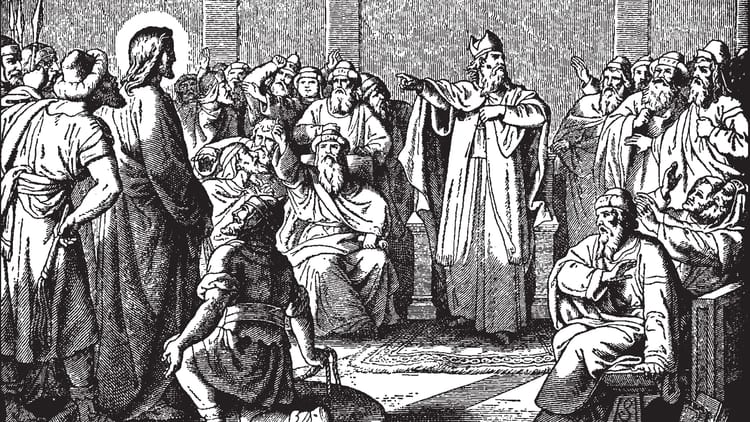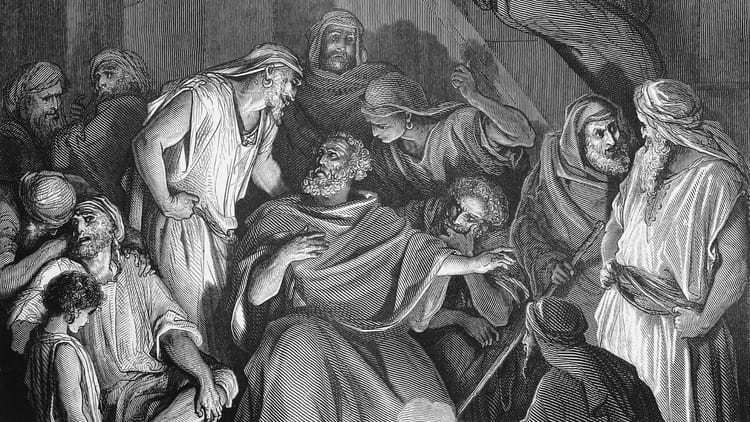Two Kingdoms (Mark 15:1-15)

We’re in Mark 15 this morning. In Mark 15, the book of Mark is reaching its climax. Jesus has been betrayed by Judas and abandoned by his disciples. He has been arrested and beaten and condemned by the religious leaders. And now he’s in his last hours. He’s about to face his death, but before he does he’s going to come up against Pilate, the Roman governor who was in charge of Judea. Only Pilate had the power to condemn Jesus to death. So as we approach this morning’s passage, Jesus is bound and beaten, completely abandoned, and about to lose his life.
This morning’s passage is really a contrast between two people. Mark has set this scene to contrast two types of strength, two kingdoms. One type of strength is the strength that we all aspire to; the other type of strength is what we’ll avoid at all costs. Mark is going to show us what true strength looks like, and if we understand this, it’s going to turn our church and our lives upside-down.
First, let’s look at the strength, the kingdom, that comes from power.
When Jesus was alive, Rome was in power over the nation of Israel. Because Rome was so huge, they appointed governors in different regions to maintain order. The Romans allowed self-government, so that each nation felt like they had some of their identity and autonomy. But the real power belonged to Rome. They had the ultimate say. They had all the military and economic power, and what they decided is ultimately what happened.
So as we open Mark 15, Jesus is brought before the most powerful person he has ever met in his life:
Very early in the morning, the chief priests, with the elders, the teachers of the law and the whole Sanhedrin, reached a decision. They bound Jesus, led him away and handed him over to Pilate.
“Are you the king of the Jews?” asked Pilate.
“You have said so,” Jesus replied.
The chief priests accused him of many things. So again Pilate asked him, “Aren’t you going to answer? See how many things they are accusing you of.”
But Jesus still made no reply, and Pilate was amazed. (Mark 15:1-5)
Notice the contrasts.
Scholars tell us that these events took place early in the morning, because Roman officials began work at daybreak so they could be free by midmorning to pursue activities of leisure. Pilate was going to enjoy the rest of his day; Jesus was on his way to being killed later that day.
Pilate was connected to the most powerful people in the world at that time. He was a mover. At one point he was considered a possible future emperor. He had connections and knew how to access the levers of power. Jesus had no connections. His closest friends had abandoned him. He had no access to the levers of power, and was completely abandoned, even by those closest to him.
Pilate was sitting in a palace. The trial probably took place in Herod’s Palace, which was used by Roman governors when they came to Jerusalem for the feasts like Passover. It was encircled with ramparts and towers. It was the largest and most elaborate of Herod’s palaces. It had two huge and elaborate reception halls in which you could entertain hundreds of guests. One historian from the period said described it as “the king’s palace, which no tongue could describe. Its magnificence and equipment were unsurpassable.” The historian wrote that this palace had rooms that were even more magnificent than the Holy Temple, Herod’s greatest edifice in Jerusalem. Pilate had free access to all of this magnificent palace. Jesus, on the other hand, came as a prisoner, bound and about to be beaten and condemned.
Pilate had troops at his disposal. It is written that he had “power even to execute.” He hadn’t been afraid to use his power either. Luke 13 tells us that he had once mixed the blood of Galileans with their sacrifices, perhaps in response to a riot. Pilate was the law, and he could essentially determine what was going to happen. There was no appeal, no supreme court to second guess his decisions.
In short, Pilate has wealth, connections, power, and leisure. Jesus has nothing – no money, no friends, no power, and no freedom. The contrast between Pilate and Jesus in this passage couldn’t be more striking.
I want us to see this today because Pilate has everything that we can hope for in our own lives. Henri Nouwen wrote:
Our addictions make us cling to what the world proclaims as the keys to self-fulfillment: accumulation of wealth and power; attainment of status and admiration; lavish consumption of food and drink; and sexual gratification without distinguishing between lust and love.
I don’t know about Pilate’s sex life, but everything else that Nouwen mentions is what Pilate had, and what we long for too: the accumulation of wealth and power; the attainment of status and admiration; the best food and drink. Pilate had it all. He had everything that we spend our lives trying to get. We want the connections, the money, and the power. In this passage, Pilate embodies everything that we normally want for ourselves.
But notice what happens in this passage. Pilate has all the advantages, but it’s Jesus who seems to be in control. We read in verse 10 that Pilate perceives that the real reason Jesus is on trial is because of the jealousy of the religious leaders. Pilate comes to an accurate conclusion about Jesus, and realizes that Jesus isn’t guilty of treason. It’s here that you begin to realize that what Pilate has is the appearance of power. He’s not a free man. In verses 6 to 15 he tries to free Jesus, but the crowd won’t let him. Look a little more carefully, and you begin to see the problem with Pilate’s strength.
He has access to the best that Jerusalem has to offer – but he hates the place. He has all the power, but he’s learned from the past to pick his battles. He’s already backed down from one battle with the Jewish people, and here again he gives in. It turns out he’s really not in control after all. Eventually he is removed from office and travels in haste to Rome to defend himself against charges. Before he could get there, the Roman emperor died, and so Pilate disappears from history. Nothing more is known about him. Pilate is a man who has everything, but even in this passage you see that there’s really nothing there.
Listen. You and I will spend our lives chasing everything that Pilate had. Many of us are doing this right now. We want the money, the leisure, the respect, and the power. But this passage shows us the futility of this kind of strength. These things are idols that promise the world but that ultimately never deliver. Mark contrasts the strength of Pilate with the weakness of Jesus, which ultimately turns out to be the greatest strength that ever existed.
So let’s look for a moment at the strength, the kingdom, that comes through weakness.
We’ve already seen the weakness of Jesus in this passage. He’s bound and abandoned. The religious leaders turn the crowd against him. An insurrectionist and murderer ends up being more popular than him. By the end of this passage, Jesus is condemned and scourged. Scouring means that Jesus would have been bound to a pillar or post and flogged with whips made of leather that were sometimes weighted with pieces of metal, bone, or even hooks. There was no prescribed number of lashes, so scourging was sometimes fatal if they got carried away. At best, it left you severely weakened and already on your way to death. There’s no greater picture of weakness than in this passage.
Yet it’s a chosen weakness. Jesus had a kingdom that far exceeded Pilate’s kingdom. Rome could not compare to the riches or the power or the acclaim that Christ enjoyed. Yet he laid it all aside and chose to become weak for our sake. He chose weakness.
The irony is that Jesus is bound and seemingly powerless, yet it’s Jesus who is in charge not Pilate, and not the crowds. Jesus had predicted that this would happen. Jesus had said back in Mark 10:
“We are going up to Jerusalem,” he said, “and the Son of Man will be delivered over to the chief priests and the teachers of the law. They will condemn him to death and will hand him over to the Gentiles, who will mock him and spit on him, flog him and kill him. Three days later he will rise.” (Mark 10:33-34)
And Jesus could have put an end to it at any moment. But he didn’t. Jesus chose everything that happened to him, because somehow his kingdom functions completely different from every earthly kingdom. His kingdom functions through weakness.
That’s why, when Pilate asks Jesus, “Are you the king of the Jews?” Jesus answers: “You have said so.” What kind of answer is that? It’s an enigmatic answer that means yes or no – or in this case, maybe it means both yes and no. Jesus says, in essence, that he is a king. But he’s not the kind of king that Pilate is. He doesn’t hold to his rights or his privileges. He’s the king who willingly leaves his throne to come to earth unrecognized, to give his life for people who don’t deserve his grace or return his love. Jesus is the kind of king who offers his life. He’s the king who lays aside his strength and comes in weakness. Isaiah 53 says:
He was despised and rejected by others,
a man of suffering, and familiar with pain.
Like one from whom people hide their faces
he was despised, and we held him in low esteem.
Surely he took up our pain
and bore our suffering,
yet we considered him punished by God,
stricken by him, and afflicted.
(Isaiah 53:3-4)
If that’s the kind of king we have, what does that mean for those of us who are in his kingdom? It means that we too will lay aside our privileges so that we can serve others. We’ll choose to be weak. Justin Martyr, an early church father who lived from 100-165, wrote:
We who used to value the acquisition of wealth and possessions more than anything else now bring what we have into a common fund and share it with anyone who needs it. We used to hate and destroy one another and refused to associate with people of another race or country. Now, because of Christ, we live together with such people and pray for our enemies.
Hear that? Willingly choosing to give up wealth and grudges. Clement, who lived around the same time, described a Christian this way:
He impoverishes himself out of love, so that he is certain he may never overlook a brother in need, especially if he knows he can bear poverty better than his brother. He likewise considers the pain of another as his own pain. And if he suffers any hardship because of having given out of his own poverty, he does not complain.
Nobody puts this better than John: “This is how we know what love is: Jesus Christ laid down his life for us. And we ought to lay down our lives for one another” (1 John 3:16). Jesus chose to be weak, and we’ll choose to become weak as well as we follow him – willingly pouring out our lives for others.
Because it’s not just a chosen weakness, it’s a saving weakness. The end of this passage gives us a picture of what happened because Jesus chose to be weak. This man, Barabbas, actually had another name: Jesus Barabbas. Somebody was going to be free; someone was going to be condemned and killed. Pilate knew that Jesus Barabbas was guilty and deserved to die. He was an insurrectionist and a murderer. Pilate also knew that Jesus did not deserve to die. He was guilty of nothing. The only reason he was on trial was because of the jealousy of the religious leaders.
Unthinkably, the convicted murderer goes free, and the innocent Son of the father is condemned. Barabbas deserves to die, but Jesus dies in his place. The love of God does for us what we can’t do for ourselves. It’s a picture of what Jesus does for every one of us who trusts in him: he dies in our place, while we who are guilty go free. 2 Corinthians 5:21 says, “God made him who had no sin to be sin for us, so that in him we might become the righteousness of God.”
Mark is showing us two kings, two types of strength. One king, one type of strength, is how we normally live. It’s about getting ahead and enjoying the best of life. As Nouwen said, it’s what “the world proclaims as the keys to self-fulfillment.” But it ultimately leads to the kingdom of self, a kingdom that ends in weakness.
But Mark shows us another type of king, another type of strength. It’s a strength that willingly lays aside its rights, the strength of a Savior who’s condemned for our sins so that we can go free.
Mark shows us two types of kings – but only one is a king who saves, and a king who will reign forever.
So Father, help us to see what Jesus did.
He left His Father’s throne above,
So free, so infinite His grace!
Emptied Himself and came in love,
And bled for Adam’s helpless race!
And I pray that all of us would trust in that kind of king.
And I pray it would change us, individually and as a church, so that we would lay down our lives for each other. I pray this in Jesus’ name, Amen.





